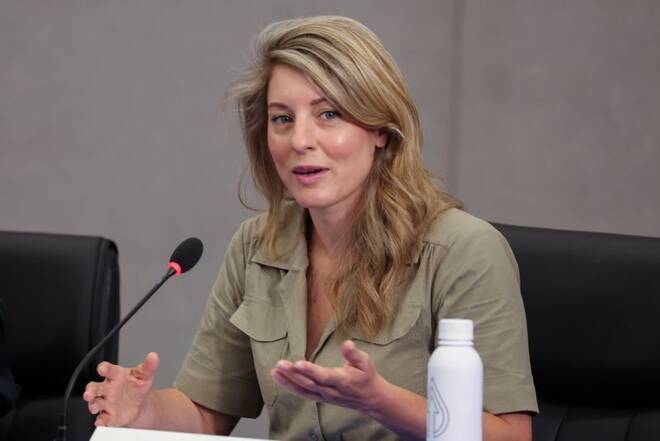Advertisement
Advertisement
Canada joining U.S.-backed Pacific group to boost ties with island nations
By:
OTTAWA (Reuters) - Canada Foreign Minister Melanie Joly on Thursday will announce it is joining a group that includes the United States, Australia, Japan, New Zealand and the United Kingdom that is aiming to boost economic ties with Pacific island nations, a source close to the matter said.
By Steve Scherer
OTTAWA (Reuters) -Canada is joining a group to boost economic ties with Pacific island nations that already includes the United States, Australia, Japan, New Zealand and the United Kingdom, according to a draft speech Foreign Minister Melanie Joly will deliver on Thursday.
“We’re pleased to be part of early discussions to help frame this initiative, and I am happy to announce Canada will be joining as a full member,” Joly will tell diplomats during the United Nations General Assembly in New York, according to a draft of her speech seen by Reuters.
“Canadians will be impacted by decisions made in the Indo-Pacific region and we want to be at the table,” Joly plans to say at an event hosted by U.S. Secretary of State Antony Blinken, a source familiar with the matter said.
The United States created the informal group dubbed Partners in the Blue Pacific in June to strengthen economic ties between the Pacific islands and the rest of the world. U.S.-China competition for influence in the Pacific islands has intensified this year after China signed a security agreement with the Solomon Islands, prompting warnings of a militarization of the region.
Joining the group is an “important step” for Canada as it drafts a new strategy for the Indo-Pacific region, said the source, who requested anonymity.
Tensions between Canada and China have been running high for years. In May, Ottawa banned the use of 5G gear from China’s Huawei Technologies Co due to national security concerns.
Canadian Prime Minister Justin Trudeau delayed the Huawei decision in 2019 because he was reluctant to move until the fate of Canadians held on espionage charges in China became clearer.
Following Canada’s detention of Huawei executive Meng Wanzhou in 2018, Beijing arrested two Canadians on spying charges. The standoff ended in September 2021 when all three people were released after U.S. prosecutors reached a deal with Meng.
These tensions have prompted the government to begin work on an Indo-Pacific strategy aimed at engaging with China on trade and climate change, while competing in other areas like critical minerals, and confronting it on human rights issues.
“Canada also plans to unveil a new Indo Pacific Strategy soon,” Joly’s draft speech reads.
(Reporting by Steve SchererEditing by Chris Reese and Grant McCool)
About the Author
Reuterscontributor
Reuters, the news and media division of Thomson Reuters, is the world’s largest international multimedia news provider reaching more than one billion people every day. Reuters provides trusted business, financial, national, and international news to professionals via Thomson Reuters desktops, the world's media organizations, and directly to consumers at Reuters.com and via Reuters TV. Learn more about Thomson Reuters products:
Did you find this article useful?
Latest news and analysis
Advertisement
